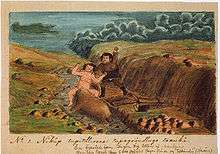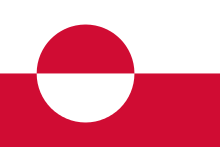Kangeq
| Kangeq Håbets Ø | |
|---|---|
|
Kangeq, ca. 1890 | |
 Kangeq Location within Greenland | |
| Coordinates: 64°07′00″N 52°04′00″W / 64.11667°N 52.06667°WCoordinates: 64°07′00″N 52°04′00″W / 64.11667°N 52.06667°W | |
| State |
|
| Constituent country |
|
| Municipality |
|
| First settled | before 1000 CE |
| Abandoned | 1973 |
| Time zone | UTC-03 |
Kangeq or Kangek (Kalaallisut: "Promontory") is a former settlement in the Sermersooq municipality in southwestern Greenland. It is located on the same island that formed the first Danish colony on Greenland between 1721 and 1728.
History
As a coastal settlement, Kangeq was positioned on the migration route of the ancient Inuit peoples. Archeological finds from the Dorset culture era have been found near Kangeq.[1] The Dorset people had vanished from the Nuuk region prior to 1000 CE.[1]
The island of Kangeq, dubbed Haabets Oe ("Island of Hope"), formed the site of Hans Egede's first settlement in Greenland after his landing on July 3, 1721.[2] The settlement was relocated to the mainland by Major Claus Paarss in 1728.[3]

In the mid-19th century, it was also home to the artist Aron of Kangeq (1822-1869), a Greenland Inuit hunter, painter, and oral historian.[4] In 1854, Kangeq became an official trading station, and an official residence was built for the assistant representing the Royal Greenland Trade Department.[5]
Today the ruins of Kangeq are sometimes visited by historically oriented tourists.[6] In 2009, the old houses of Kangeq were used as a backdrop for the Eksperimentet film, with the settlement emulating the look of Nuuk in 1952.[7]
Geography
Kangeq was located in an island at the mouth of the Nuup Kangerlua fjord,[8] on the coast of Labrador Sea, approximately 18 km (11 mi) west-south-west of Nuuk, the capital of Greenland.[5]
Former notable residents
- Aron of Kangeq (1822-1896), painter and oral historian[9]
References
| Wikimedia Commons has media related to Kangeq. |
- 1 2 "Human History". Nuuk Tourism. Archived from the original on March 10, 2010. Retrieved 15 July 2010.
- ↑ Saabye, Hans Egede; Fries, Georg; Lloyd, Hannibal Evans (1818). Greenland: Being Extracts from a Journal Kept in that Country in the Years 1770 to 1778. Boosey and Sons. p. 73.
- ↑ "Hans Egede". Missionariesbiography.com. Retrieved 21 September 2016.
- ↑ "Suluk 2007 No.2" (PDF). Air Greenland. Archived from the original (PDF) on 7 September 2008. Retrieved 15 July 2010.
- 1 2 Gulløv, Hans Christian (1997). From Middle Ages to Colonial Times: Archaeological and Ethnohistorical Studies of the Thule Culture in South West Greenland 1300-1800 AD. Commission for Scientific Research in Greenland. p. 412. ISBN 978-87-90369-21-7.
- ↑ "A sailing adventure to the abandoned fishing village of Kangeq". The Fourth Continent. Retrieved 31 August 2013.
- ↑ "Kangeq med i film". Sermitsiaq (in Danish). 21 July 2009. Archived from the original on September 12, 2010. Retrieved 15 July 2010.
- ↑ The Atlantic Walrus (Odobenus rosmarus rosmarus) in West Greenland. Museum Tusculanum Press. p. 6. ISBN 978-87-635-1227-5.
- ↑ Nuttall, Mark (12 November 2012). Encyclopedia of the Arctic. Routledge. p. 158. ISBN 978-1-136-78680-8.

